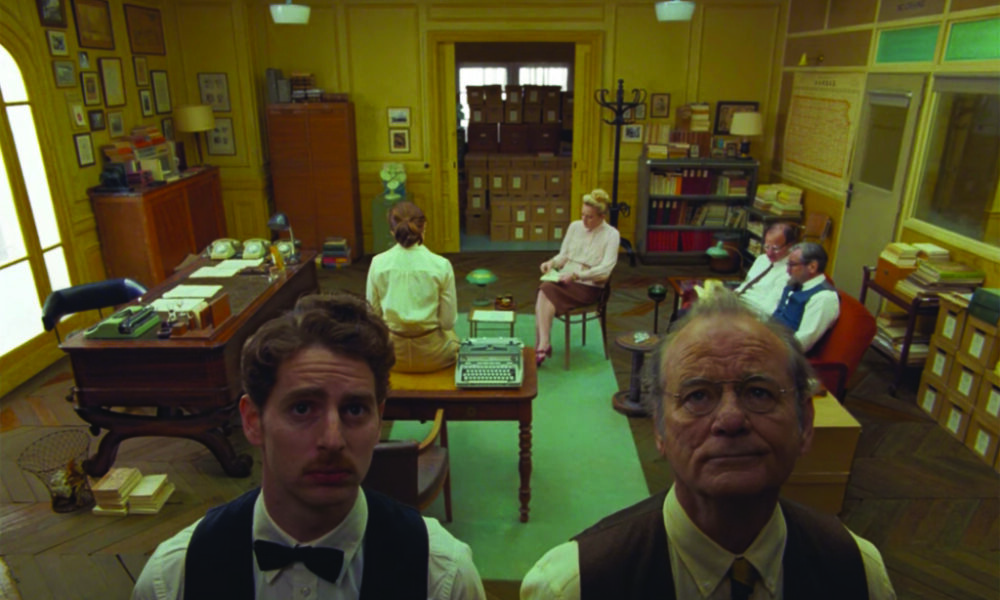A new Wes Anderson film is an event in and of itself. How could it not be? In the last decade, the American filmmaker has become an international sensation, having produced iconic films like the delightful Moonlight Kingdom (2012), and the Oscar-winning The Grand Budapest Hotel (2014). Love him or hate him, it’s clear from the countless, insufferable film class projects you may have had to endure that trademark features of the Wes Anderson cinematic style—recurring casts, symmetrical camera work, meticulously curated soundtracks—have left a deep imprint in our cultural consciousness. Although The French Dispatch loyally upholds the director’s famed aesthetics, it attempts little else, making for a bland and unsubstantial film despite its rich subject matter.
In this latest project, Anderson sets his movie in the fictional confines of mid-century Ennui-sur-Blasé—the small, quirky French town of any film-bro’s dreams. The French Dispatch cinematically reenacts the titular publication’s final issue in a series of somewhat-connected vignettes, told from the perspectives of the journalist behind each feature.
Because of the film’s portmanteau structure, watching The French Dispatch inevitably feels like watching three or four Anderson films in quick succession, making for a very uneven viewing experience. Other than the film’s exasperating pacing, it raises some additional questions: Why must every Anderson female love interest be foreign—and preferably French? Why is the agonizingly kitschy middle portion of the film—where a student protest is reduced to a silly game of chess—in the movie at all?
As a general rule, Anderson’s films don’t care for politics or messages. He is much more concerned with aesthetics, hijinks, and wit—which is fair, but can sometimes feel jarring, depending on the film. He has an annoying tendency to tease at the idea of profundity in his stories without properly exploring their more nuanced themes and subject matters. In the case of The French Dispatch, the figure of the journalist is reduced to yet another object under Anderson’s romanticizing gaze. In the end credits, he gives special mention to the literary greats who inspired him, like Mavis Gallant and James Baldwin. But if this film is indeed intended to be “a love letter to journalists,” wouldn’t he have given more gravitas to the serious socio-political events and issues which real-life mid-century era journalists reckoned with in their writings, rather than ignoring them or trivializing them to the point of absurdity? The answer is no—naturally, none of this truly concerns Anderson.
What the director wants is for you to indulge him while he geeks out for an hour and a half, as the caricatures of his heroes act out trifling pastiches on top of his elaborate set pieces, and for you to be oh-so endeared.
One of the only instances where the film feels a bit more substantial is in its last and most poignant segment. Critic Roebuck Wright (Jeffrey Wright) is assigned to write about a dinner prepared by legendary officer chef Nescaffier (Steve Park) and instead becomes embroiled in a high-stakes kidnapping plot. The two have a conversation about the alienation they feel as a result of their mutually marginalized identities within French society; Wright is a Black, gay journalist, and Nescaffier is a police officer of East Asian descent. Other than a few short scenes such as this one, the film is allergic to emotional sincerity of any kind. A mantra repeated by multiple characters throughout the film is “No crying.”
The self-conscientious artifice of Anderson’s films is part of what makes them so endearing to audiences, but in The French Dispatch, one comes to realize that this only serves to distract from the film’s fundamentally hollow core. Despite its visual beauty, Anderson’s latest effort ultimately feels regressive and dull. At this point in his career, blessed with star-studded casts and free to do whatever he wants, the director seems almost adverse to evolving artistically. As an old saying goes, a little bit of Wes Anderson goes a long way. Perhaps The French Dispatch is a true show of the limits of his auteurial abilities—or maybe I’m just finally growing out of my Wes Anderson phase.









